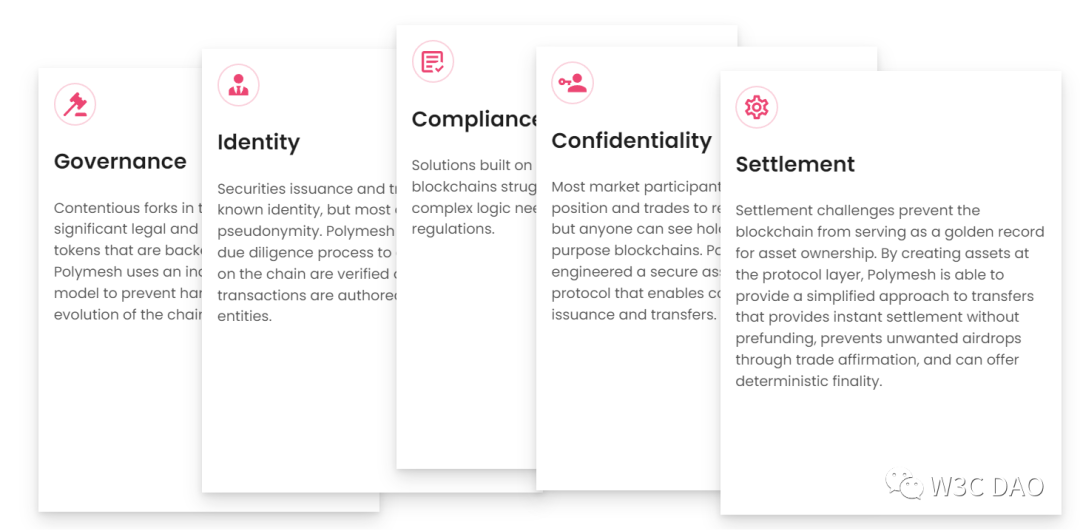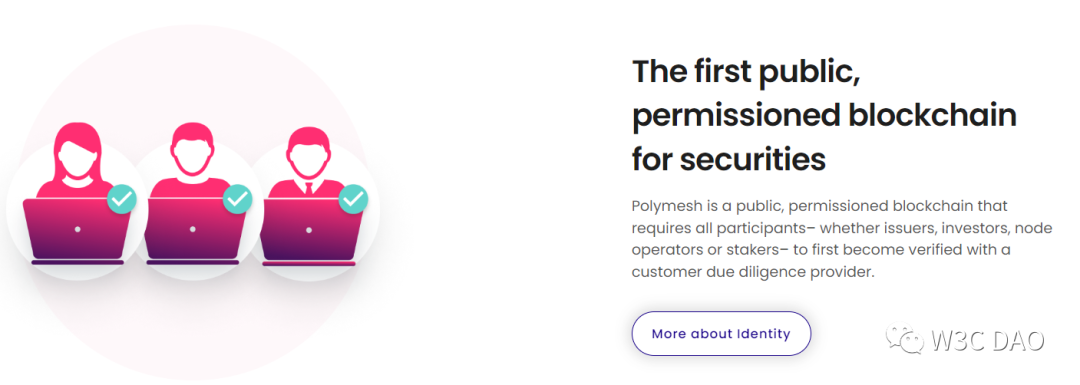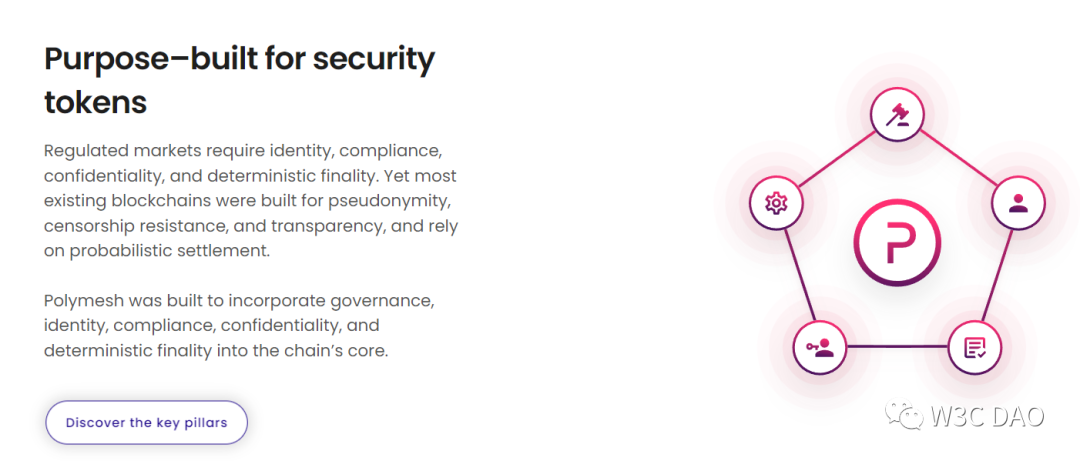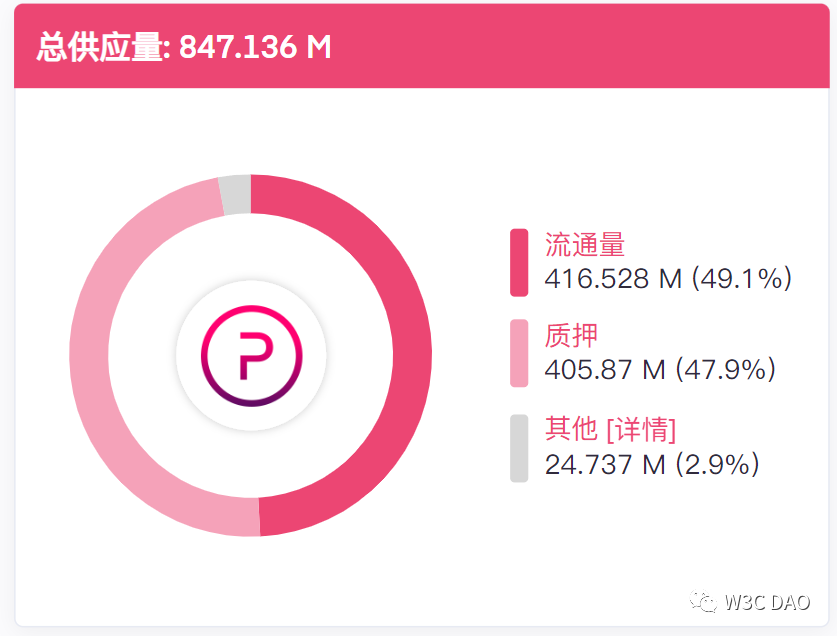01. Project Background
Polymesh is a blockchain platform designed specifically for tokenizing real assets, aiming to address the challenges of compliance, scalability, confidentiality, and governance faced by existing public chains.

Tokenized real assets are digital securities representing physical assets or rights, such as stocks, bonds, funds, real estate, etc. Tokenized real assets have the potential to change the operation of traditional financial markets, improving efficiency, reducing costs, increasing liquidity, and transparency.

However, the development of tokenized real assets also faces some obstacles, mainly due to the unsuitability of existing public chain platforms to accommodate the characteristics and requirements of tokenized real assets. For example:
Compliance: Public chain platforms often lack regulatory support and compliance tools for tokenized real assets, making it difficult for issuers and holders to comply with legal requirements in different jurisdictions, such as disclosure requirements, trading restrictions, tax obligations, etc.
Scalability: Public chain platforms are often limited by their consensus mechanisms and network capacity, resulting in slow transaction speeds, high fees, low throughput, affecting the trading efficiency and user experience of tokenized real assets.

- Confidentiality: Public chain platforms typically use a completely transparent ledger model, resulting in the complete public disclosure of transaction data and holder information of tokenized real assets, which may lead to privacy leaks, market manipulation, competitive risks, etc.
To address these issues, Polymath announced the launch of the Polymesh project in 2019, aiming to create a blockchain platform specifically designed for tokenized real assets. Polymath believes that in order for tokenized real assets to truly realize their value, a dedicated blockchain platform focused on tokenized real assets is needed, rather than a general-purpose public chain platform.
02. Project Introduction
Polymesh is a customizable, upgradable, and interoperable blockchain platform built on the Substrate framework. Polymesh adopts various innovative designs and features to meet the specific needs of the tokenized real asset field. The following are the main features of Polymesh:
- Compliance: Polymesh provides a comprehensive compliance framework and tools, including identity registration, permission management, compliance committee, compliance rule engine, etc. These features enable tokenized real asset issuers and holders to easily comply with various laws and regulations, and to adjust and update when necessary. In addition, Polymesh also supports various types of tokenized real asset standards, such as ST20, ERC-1400, etc.

- Scalability: Polymesh adopts a proof of stake (PoS) consensus mechanism called BABE, which can achieve efficient, secure, and decentralized block production. Polymesh also utilizes a finality protocol called GRANDPA, which can achieve fast, deterministic, and adaptive block confirmation. These technologies enable Polymesh to achieve processing capacity of thousands of transactions per second, far exceeding public chain platforms such as Ethereum.

- Confidentiality: Polymesh adopts a mechanism called Confidential Security Tokens (CST), which can achieve partial or complete confidentiality of tokenized real assets. CST is a type of tokenized real asset based on zero-knowledge proof (ZKP) technology, which can prove the validity and compliance of transactions without revealing any sensitive information. This allows transaction data and holder information of tokenized real assets to be selectively disclosed or hidden according to different needs and preferences.

- Governance: Polymesh adopts a governance model called Politeia, which can achieve a fair, transparent, and democratic governance process. Politeia is a governance mechanism based on voting weight and proxy weight, allowing participants of different types and scales to initiate proposals, express opinions, and participate in decision-making on the Polymesh platform. This enables broad community support and participation in the development direction and major decisions of the Polymesh platform.
03. On-chain Data
The on-chain data of Polymesh is as follows:
- Block Height: 9,515,977
- Signed Transactions: 63,694
- Total Tokens: 847.136 M
- Token Staked: 405.87 M
- Staking Rate: 47.9%
- Inflation Rate: 10.36%

POLYX is the native token of the Polymesh platform, used for paying transaction fees, participating in staking, governance, etc.

04. Team
The Polymesh project is led by Polymath. Founded in 2017 and headquartered in Toronto, Canada, Polymath is an innovative company focused on the field of tokenized real assets. Polymath has a team of experts in finance, blockchain, law, and other fields, dedicated to creating a simple, user-friendly, and compliant platform for tokenized real assets.

The following are some core members of the Polymath team:
Trevor Koverko: Founder and CEO of Polymath, a former professional hockey player who transitioned into a serial entrepreneur and angel investor, investing in multiple blockchain projects such as ShapeShift, EOS, Shyft, etc.
Chris Housser: Co-founder and COO of Polymath, a senior lawyer and entrepreneur with experience in legal consulting and project management in various fields including finance, real estate, technology, etc.
Thomas Borrel: CPO of Polymath, a fintech expert with over 20 years of experience, having held senior positions in several well-known financial institutions and technology companies such as Barclays, PwC, IBM, etc.
05. Investment Institutions

06. Conclusion
Polymesh is a blockchain platform designed specifically for tokenizing real assets, led by Polymath. Polymesh aims to address the challenges of compliance, scalability, confidentiality, and governance faced by existing public chains, providing a simple, user-friendly, and compliant security token platform. Polymesh adopts various innovative designs and features, including identity registration, permission management, compliance committee, compliance rule engine, CST mechanism, BABE consensus mechanism, GRANDPA finality protocol, Politeia governance model, etc. The Polymesh project is expected to become a leader and innovator in the security token field, bringing revolutionary changes to traditional financial markets.
免责声明:本文章仅代表作者个人观点,不代表本平台的立场和观点。本文章仅供信息分享,不构成对任何人的任何投资建议。用户与作者之间的任何争议,与本平台无关。如网页中刊载的文章或图片涉及侵权,请提供相关的权利证明和身份证明发送邮件到support@aicoin.com,本平台相关工作人员将会进行核查。




